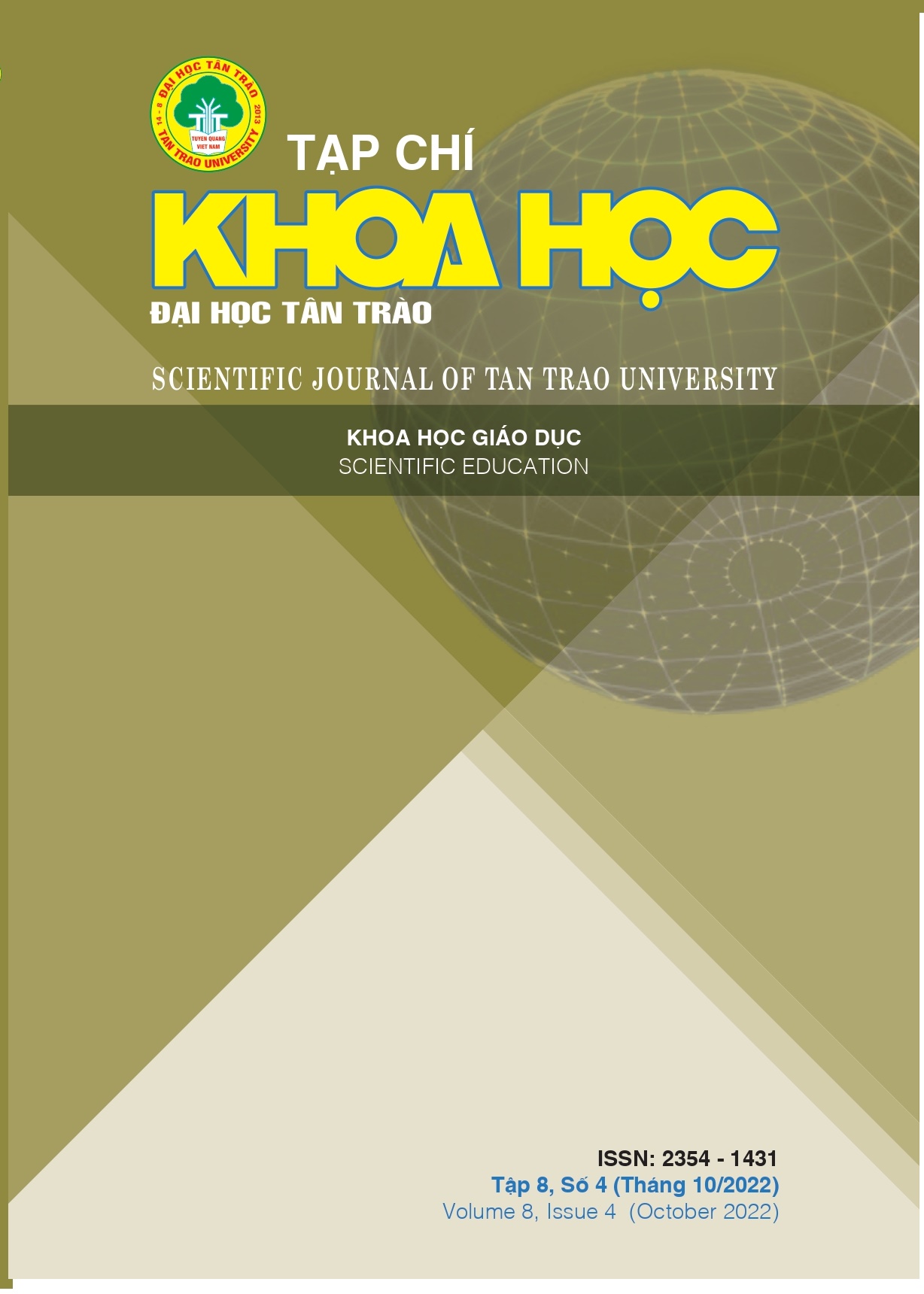CÁC YẾU TỐ LO LẮNG ẢNH HƯỞNG ĐẾN KHẢ NĂNG NGHE HIỂU CỦA SINH VIÊN KHÔNG CHUYÊN TIẾNG ANH
DOI:
https://doi.org/10.51453/2354-1431/2022/813Từ khóa:
Các yếu tố lo lắng, nỗi lo lắng khi học nghe, khả năng nghe hiểu, Foreign Language Listening Anxiety Scale (FLLAS).Tóm tắt
Nghiên cứu theo phương pháp hỗn hợp làm sáng tỏ các yếu tố ảnh hưởng đến nỗi lo lắng của 84 sinh viên không chuyên năm thứ 2 tại một trường đại học công lập ở Việt Nam trong giờ học nghe. Nghiên cứu thu thập dữ liệu qua Bảng câu hỏi khảo sát phỏng theo Kim (2000) và phỏng vấn bán cấu trúc, nhằm tìm hiểu nỗi lo lắng của sinh viên liên quan đến yếu tố về giảng viên, sinh viên và tài liệu sử dụng trong giờ học nghe. Kết quả cho thấy sinh viên lo sợ nhất là mất khả năng tập trung trong quá trình nghe, cách phát âm và giọng điệu lạ, tốc độ của bài nghe và các biểu hiện của giảng viên dạy nghe. Nghiên cứu cũng chỉ ra một số hạn chế đồng thời cung cấp một số đề xuất sư phạm nhằm giảm tải nỗi lo lắng của sinh viên trong giờ học nghe tiếng Anh.
Tải xuống
Tài liệu tham khảo
[1]. Cresswell, J. W. (2012). Educational research: Planning, conducting and evaluating quantitative and qualitative research (4th ed.). Boston: Pearson Education.
[2]. Dalman (2012). Listening Anxiety: The Relationship between Listening Anxiety, Listening Comprehension Strategies, and Listening Performance. German: Lambert Academic Publishing.
[3]. Fang, X. (2011). Anxiety in EFL listening comprehension. Theory and Practice in Language Studies, 1(12), 1-3.
[4]. Kim, J. H. (2000). Foreign language listening anxiety: A study of Korean students learning English. Doctoral thesis. University of Texas, Austin.
[5]. Kimura, H. (2008). Foreign language listening anxiety: Its dimension and group differences. JALT Journal, 30(2), 173-196.
[6]. MacIntyre, P. D., & Gardner, R. C. (1994). The subtle effects of language anxiety on cognitive processing in the second language. Language learning, 44(2), 283-305.
[7]. Gonen, M. (2009). The relationship between FL listening anxiety and FL listening strategies: The case of Turkish EFL learners. In Proceedings of the 5th WSEAS/IASME International conference on educational technologies (pp. 44-49).
[8]. Serraj, S. (2015). Listening anxiety in Iranian EFL learners. International Journal of Scientific and Research Publications, 5(6), 1-8.
[9]. Tran, T. T. X. (2019). Anxiety in foreign language classrooms at Hanoi National University of Education. Vietnam Journal of Education, 6, 60-64.
[10]. Tran, T. T. T., Moni, K. and Baldauf Jr., R. B. (2019). Foreign language anxiety: Understanding its sources and effects from Insiders’ perspectives. The Journal of Asia TEFL, 10(1), 95-131.
[11]. Vandergrift, L. (1997). The comprehension strategies of second language (French) listeners: A descriptive study. Foreign Language Annals, 30(3), 387-409. DOI: 10.1111/j.1944-9720.1997.tb02362.x.
[12]. Vogely, A. J. (1998). Listening comprehension anxiety: Students’ reported sources and solutions. Foreign Language Annals, 31(1), 67-80.
[13]. Zhai, L. L. (2015). Influence of Anxiety on English Listening Comprehension: An Investigation Based on the Freshmen of English Majors. Studies in Literature and Language, 11(6), 40-47.
Tải xuống
Đã Xuất bản
Cách trích dẫn
Số
Chuyên mục
Giấy phép

Tác phẩm này được cấp phép theo Giấy phép Quốc tế Creative Commons Attribution-ShareAlike 4.0 .
Bài báo được xuất bản ở Tạp chí Khoa học Đại học Tân Trào được cấp phép theo giấy phép Ghi công - Chia sẻ tương tự 4.0 Quốc tế (CC BY-SA). Theo đó, các tác giả khác có thể sao chép, chuyển đổi hay phân phối lại các bài báo này với mục đích hợp pháp trên mọi phương tiện, với điều kiện họ trích dẫn tác giả, Tạp chí Khoa học Đại học Tân Trào và đường link đến bản quyền; nêu rõ các thay đổi đã thực hiện và các nghiên cứu đăng lại được tiến hành theo cùng một bản quyền.
Bản quyền bài báo thuộc về các tác giả, không hạn chế số lượng. Tạp chí Khoa học Tân Trào được cấp giấy phép không độc quyền để xuất bản bài báo với tư cách nhà xuất bản nguồn, kèm theo quyền thương mại để in các bài báo cung cấp cho các thư viện và cá nhân.
Mặc dù các điều khoản của giấy phép CC BY-SA không dành cho các tác giả (với tư cách là người giữ bản quyền của bài báo, họ không bị hạn chế về quyền hạn), khi gửi bài tới Tạp chí Khoa học Đại học Tân Trào, tác giả cần đáp ứng quyền của độc giả, và cần cấp quyền cho bên thứ 3 sử dụng bài báo của họ trong phạm vi của giấy phép.


